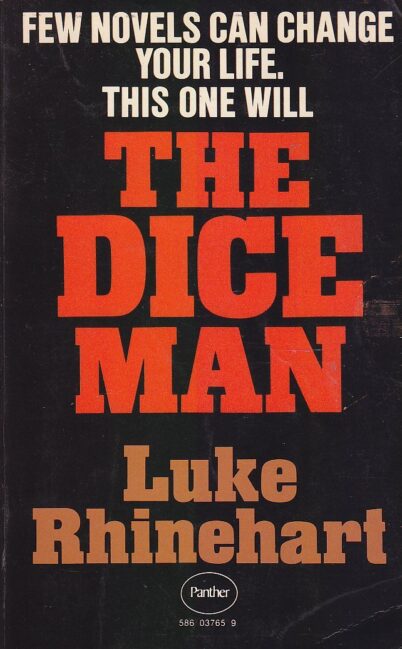 By LUKE RHINEHART (Panther; 1972/77)
By LUKE RHINEHART (Panther; 1972/77)
According to the cover of this book’s Panther paperback edition, “Few Novels Can Change Your Life. This One Will.” That’s a pretty bold pronouncement, yet this novel, about a man who makes decisions according to a roll of the dice, is said to have inspired many people around the world to live in just that fashion. That’s despite the fact that THE DICE MAN exists as a cautionary tale with a satiric edge, forcibly showing how the abandonment of personal morality leads to nowhere good.
… a cautionary tale with a satiric edge, forcibly showing how the abandonment of personal morality leads to nowhere good.
Author “Luke Rhinehart,” a.k.a. George Powers Cockcroft (1932-2020), places himself at the center of this nutty tale. He’s a psychiatrist (in reality an English professor) who grows bored with his profession, and with life in New York City, as deviant desires increasingly assail his thoughts. At a party one night he impulsively rolls a die, deciding that if it lands on one he’ll rape the wife of a colleague. Guess what? The die does indeed land on one, and Rhinehart does indeed go through with the planned violation.
THE DICE MAN is fun, although its depiction of early 1970s psychiatry works only as satire…
This leads to a depraved odyssey of unrestrained impulsiveness as Rhinehart repeatedly acts out his darkest fantasies based on the dictates of the die. His marriage is upended, and his employment suffers, but he gets many patients to become “Dice Men” themselves, leading to the formation of Dice Centers and a dice-centered religion (“Blessed be the name of the Die”) based around a text known as THE BOOK OF THE DIE. Eventually Rhinehart decides to take his dice-ruled existence to a new level by contemplating murder, an act the die commands him to carry out.
THE DICE MAN is fun, although its depiction of early 1970s psychiatry works only as satire (realistically speaking, Rhinehart would have been booted from any legitimate psychiatry practice early on, and I doubt any of the sex-based Dice Centers would stay open for very long). Likewise the many questionable acts Rhinehart commits, which are never very troubling or disturbing; the woman Rhinehart rapes early on, for instance, is a dissatisfied sort who offers her consent (so it isn’t actually rape), while the victim of the climactic murder is a slimy masochist whose death (which comes after a deliriously depraved orgy) is neither unexpected nor entirely undeserved.
As a comedic commentary on societal repression and the inherent ridiculousness of psychiatry THE DICE MAN works. It is, however, not nearly as subversive it could—nay, should—have been. One can only imagine what a horror writer might have done with this material.
